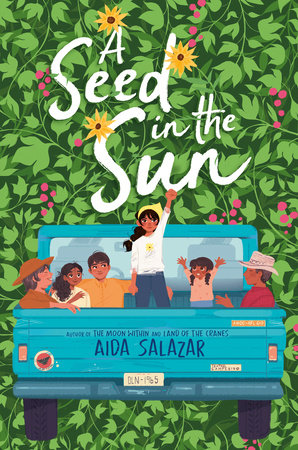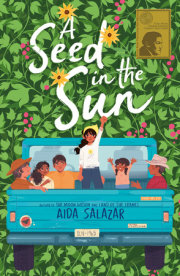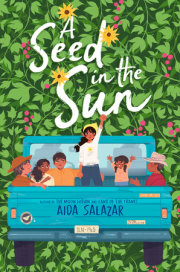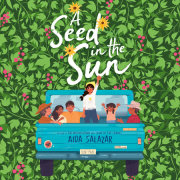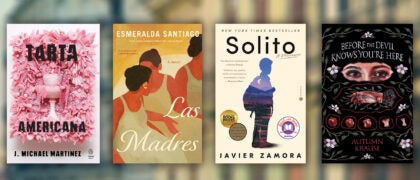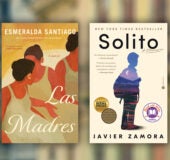SemillaThey tried to bury us
but they didn’t know
we were seeds.
—Mexican Proverb
Imperial Valley, California • March 1965
Remolino
I sometimes think about how
I lost my voice.
I could have buried it in the earth,
in the surco, the long row of dry dirt
where we planted onion bulbs last spring
while the heat of a too-hot California day
fell on our
arched
backs
like barrels
of sun.
It could have happened
when Papá screamed for me to work faster
just as I was singing along
to Mamá’s song
louder than Papá’s angry words
or the drone of planes spraying the fields overhead.
It could have been taken
by the roaring remolino
that slammed into us
like the storm of Papá’s belt when we upset him,
an out of nowhere tornado
ripping through the fields.
maybe that’s when the dirt-drenched air
pulled
my voice out of my breath
and caught it in the
spin of wild wind.
What's left is a whispery rasp
an orange-yellow mist
that comes and goes
like clouds.
My real voice is either somewhere
in the tumble of dirt
in the onion fields
of the Imperial Valley
or
was taken by
the anger of the wind.
One day, I pray it comes back.
Delano, California • September, 1965
Open-Sky Hammocks We drown bedbugs
in a pail of water,
chinches we pluck
from the mattresses
propped up outside
on rusty barrack walls.
The worst kind of chore
on our first day in Delano,
in another labor camp
as terrible as the last
and the one before that.
Concha and Rafa race to see
who can drown more bugs.
They beat me by a lot
because they’re
five and four years older.
I ask Mamá if we can sleep
in our hammocks instead
but she doesn’t turn around.
She still can’t hear the tiny hiss
that comes from me when I try to speak.
“¡Mamá!” I try to say louder.
She reads the question on my lips.
“Lula, the mattresses are better so we are together
and not hanging like leaves from the trees.”
Me? I’d rather sleep outside
in a crest of oaks
at the edge of the grape fields
all around us
with surcos like long fingers
spread throughout the vineyard
and thick vines
growing big across the wires.
I’d rather sleep beneath
a blue-black sky glistening
with bright stars.
A stage. A place to dream.
Where I can announce
a make-believe circus like a ringmaster
to an audience of hooting owls
hunting field mice in the night.
Outside under the dense, starry sky
we can only see in the back roads of California
where we work and chase the harvests,
so different from the city where we hardly go
and where the glow of lights washes away the contrast.
Yes, it’s colder in our hammocks
than in the one-room wooden barrack,
especially in the winter,
but so much better
than getting eaten alive by chinches.
“Pero, Mamá, I wish we could . . .” I try to argue.
“No time for wishing now, Lula.”
Mamá leans on my shoulder
as she passes me holding a grass broom.
Her long thick braid lays against her neck
as her body bends like a willow branch,
and she sighs,
“Vamos, Lula, Concha, Rafa. Let’s keep cleaning,
mis amores.”
Light Blue SchoolhouseI watch water glisten as it splashes
against the tin of the pail I fill
at the only tap at this new but familiar camp.
I think of the light blue schoolhouse
I saw from the truck as we arrived,
and my panza flutters.
I wonder about the new school year
and if the school will have
a twelfth grade for Concha
and a seventh grade for me
because there’s never a guarantee.
A school!
Where we’ll be the new faces
along with other farmworker kids
whose families came like ours
for the grape harvest
and who also won’t know
what they’ll be learning
and will struggle to catch up.
An actual school!
Not housework,
not watching my baby siblings,
and not field work.
Back in Bakersfield
Rafa missed so many days
he was whittled down two whole grades.
That’s when he had it
and instead followed Papá and Mamá
into the fields each daybreak
to pick whichever crop was in season.
Truant officers didn’t even blink
to see him in the fields
as dandelion tall as he is.
I’d taken what Concha
once told me to heart.
No matter how much we miss,
no matter if teachers are mean,
no matter they sometimes punish us
for speaking Spanish,
no matter if we can’t keep friends,
school is ours.
“Lula, you’re here to soak up anything you can,
porque tomorrow, we’ll be on the road again
and the only thing you can take with you”
—she tapped my head— “is up here.”
The best thing about Concha
is she loves school
as much as me.
Concha’s gentle brown eyes
are maps
when I can’t find my way.
Baby WorkPapá comes back
with work orders from the crew leader
and a face folded in worry.
He, Mamá, and Rafa
will pick grapes tomorrow morning.
Our baby sister, Gabriela,
and babiest brother, Martín,
will go with them
so Concha and I can get to school.
Mamá doesn’t ask us to
work the fields to pick cotton,
potatoes, strawberries, or grapes
because that’s when school’s in session.
Mamá doesn’t ask us to skip school
to watch the babies, either,
she likes what we learn
about the world outside the fields.
She loves to hear us translate for her
the stories in the books we get to read,
the English transforming into the Spanish
that she and Papà speak.
Threat of a truant officer
or no truant officer,
I don’t think Mamá
would want it any other way.
I wouldn't mind watching the babies,
Gabi and Martín are
two balls of sweet masa with legs.
Gabi’s almost three and runs
like a cheetah on her bare feet
with one too many toes on each foot.
Mamá calls her “una hija de Dios”
and because she’s a child of God,
she is perfect just as she is
with no need for shoes
we can’t afford anyway.
Martín crawls like a ladybug
because being one year old is still pretty little.
He reaches up
with his
dimpled hands
whenever he wants
to be carried,
and we always happily sweep him up.
It’s not hard to do squishy baby work like that.
EscabsI overhear Papá tell Rafa,
“Caramba, we just walked into a strike. Men with picket
signs and bullhorns were yelling at all of us not to work.”
“What do you think they’re fighting for, Apá?”
I get closer but he pulls Rafa inside,
and gives me a “what do you want, nosy”
kind of look but I can still hear him.
“Los Filipinos seem to have left the fields because they
want higher wages. They’re en huelga, and they think
we’re taking their jobs,” he says.
“Do you think there’ll be trouble, Apá?” Rafa asks.
“Pues they were protesting and screaming ‘Don’t
be escabs!’ at us while we were getting crew orders.
Josesito said
escab means traitor because we are crossing
their picket line.”
Papá says the word
scab like
his tongue is a skipped record
adding a syllable up front.
Mamá is sitting on the edge of the bed,
holding her head between her hands
like she’s hurt,
frowning into her closed eyes.
I want to see what’s wrong with her
but I stay outside the barrack
so Papá doesn’t know
I’m snooping.
Martín toddles up to Papá,
reaches up to him.
Papá unfolds his brows and arms,
lifts him up and tosses him into
the air with an “Ah, ¡mi muchachito!”
Papá saves his sweetness for the babies.
As soon as we get older,
seeing his love for us
is a sight as rare as rain
falling on desert earth.
Carpa Smiles I remember a time
before the whirlwind,
a time before Gabi and Martín were born
when we snuck into the circus.
Rafa and me.
Papá went without
his bottles of beer for once
to buy three tickets
for Mamá, Concha, and him.
Hidden behind crates,
Rafa held up the tent’s wall
to keep me from getting scratched
like he did as he crawled
beneath the canvas.
We emerged into a flurry of people
trying to get a seat to see La Carpa Vázquez,
the traveling Mexican circus.
We squirmed, pushed, and shoved
other kids to sit up front.
As the lights began to dim,
I searched and found
Concha, Mamá, and Papá
sitting still inside a crowd
moving like ants around them.
Suddenly the lights, the music,
and a loud, booming voice
welcomed us.
“Señoras y señores, niños y niñas, welcome to the
world-famous La Carpa Vázquez!”
That’s when I saw it.
Papá’s smile,
with its missing right-side molar.
A smile so pretty and wide
it shined like a galaxy
in the center
of the deep brown night
of his face.
I don’t understand why
he never lets us see it,
but seeing him smile
because of the ringmaster’s smooth voice
opened up my own sonrisa
like a squash bloom
following
the light of day.
I swept my head around
and was pulled like never before
and never since
into the magic of la carpa.
The clown jugglers,
the comedians, the singers,
the dancing dog show,
the tightrope walkers,
and the flying trapeze.
Rafa and me clapped, hollered,
and fell on each other,
¡muriéndonos de risa!
When I took a breath,
a dream was etched in my heart,
to join the circus one day,
as ringmaster.
I think about the ringmaster
whenever I am still.
I think about how his voice
made the lights of Papá’s face
come alive.
I want to be one of the reasons Papá smiles.
Copyright © 2022 by Aida Salazar. All rights reserved. No part of this excerpt may be reproduced or reprinted without permission in writing from the publisher.

